Fewer than one-half of consumers trust in government and media. Three-quarters trust employers, who in 2019 are the top-trusted institution according to the 2019 Edelman Trust Barometer released last week in Davos at the World Economic Forum.
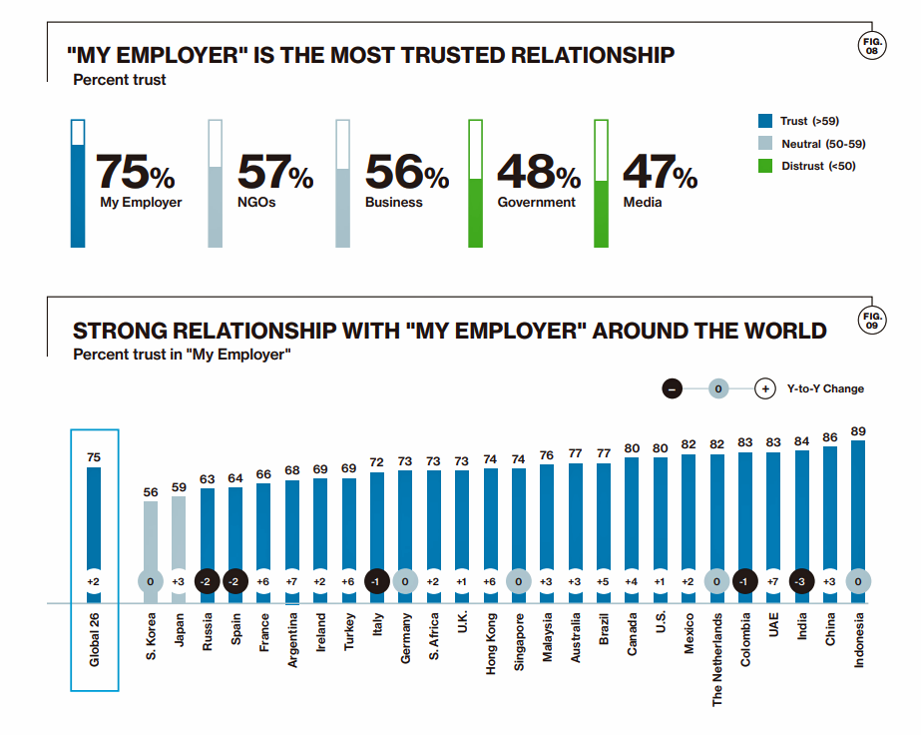
Consumers in the U.S. over-index for trust in employers, with 80% of people saying they have a strong relationship with “my employer,” compared with 73% of Britons, 66% of the French, and 59% of people in Japan.
What’s underneath this is employers being trusted to provide certainty: most workers look to their employer to be a trustworthy source of information about social issues and topics about which there isn’t universal agreement. But there is a nuance here: while 72% of people globally trust employers on information about the economy, only 58% of workers believe their employers on the issue of technology.
My hypothesis on this is workers’ concerns about the impact of artificial intelligence (AI) and robotics on jobs. Note that AI was a major topic of discussions through the World Economic Forum Agenda. For example, here’s a summary of changing the AI narrative to reskill the workforce, bolster “bilinguality” among workers in terms of building up AI human capital, and ensuring against bias in AI applications.
Then there was this less favorable take on the AI-Davos conversations published in the New York Times on the “hidden automation agenda of the Davos elite.”
And here’s an essay right from the Davos folks’ WEF blog on why AI may fail women in the workplace and in the world.
So it’s interesting to note that Edelman found workers concerned about job security around the world. “Fears of job loss remain high,” the second chart asserts. Most employees are concerned about not have the training and skills to access a good job, and are concerned about innovations “taking my job away.”
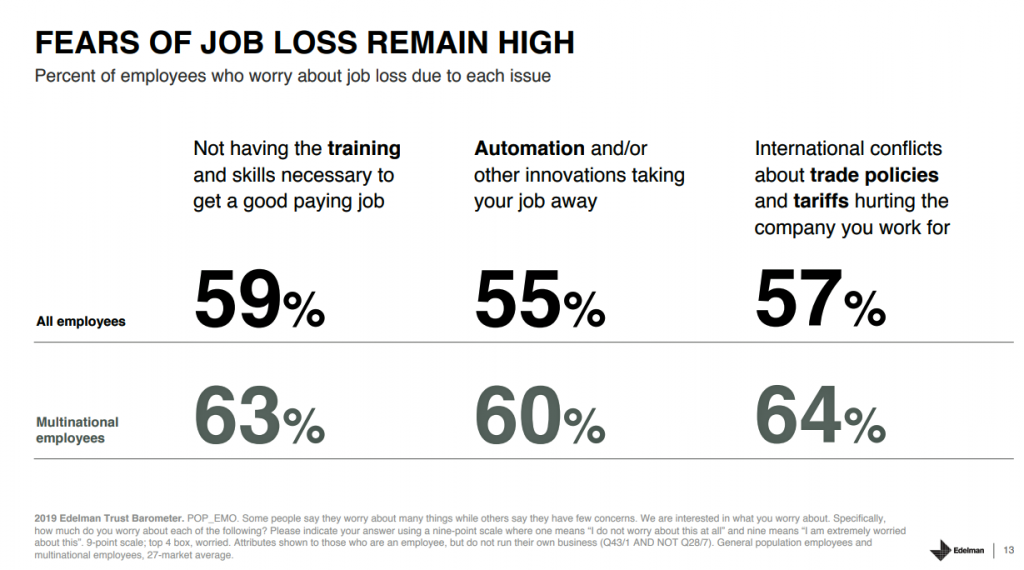
It follows, then, that 8 in 10 consumers said how a company treats its employees is one of the best indicators of its level of trustworthiness. Furthermore, two-thirds of global consumers believe that a company’s good reputation may induce them to try a product, but unless they come to trust that company behind the product, they’ll soon stop buying it.
Edelman found that the most trusted employers lead on change across several dimensions in this order: societal impact, how an organization contributes to a better society; the organization’s values; the organization’s vision of the future; the organization’s mission and purpose; and, operational considerations like decisions that could affect “my job.” I note the order of importance, because larger societal impact comes here before how the organization’s decision impact my specific job.
One of the most striking findings in this year’s Trust Barometer is the gender gap between men and women when it comes to trust. Fewer women trust the different institution types across the board, with the largest gap toward business.
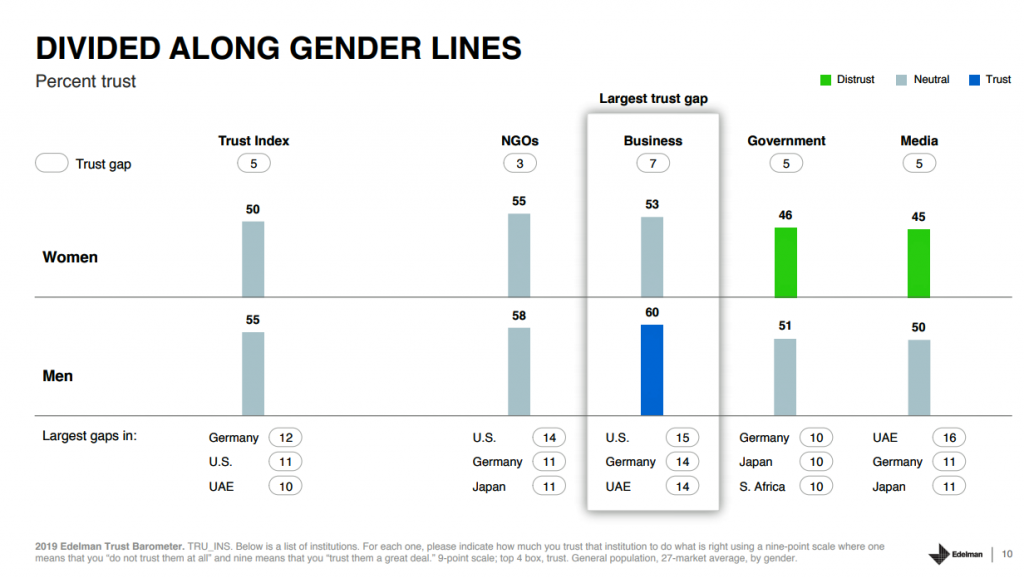
Furthermore, women tend to use social media more and “amplify” their opinions, news and information more frequently than men do by a relatively large margin. Social amplification is even more pronounced among women who are part of Edelman’s segment of the informed public. In Edelman methodology, the informed public are those consumers who are between 25 and 64 years of age, college-educated, in the top 25% of household income in their market, and report heavy media consumption and engagement in business news.
The percent of women from the informed public that amplify news and information brew 23 percentage points over one year 2018-2019, versus 18 percentage points among men.
The Mars vs. Venus consideration plays out in another question Edelman asked regarding what leadership issues people believe CEOs should lead on. The top three responses were equal pay, prejudice and discrimination, and training the jobs of tomorrow — issues that concern women, in particular those top two items.
Health Populi’s Hot Points: Since you are reading Health Populi, I must pull out the one data point in the Trust Barometer most central to our coverage: health care.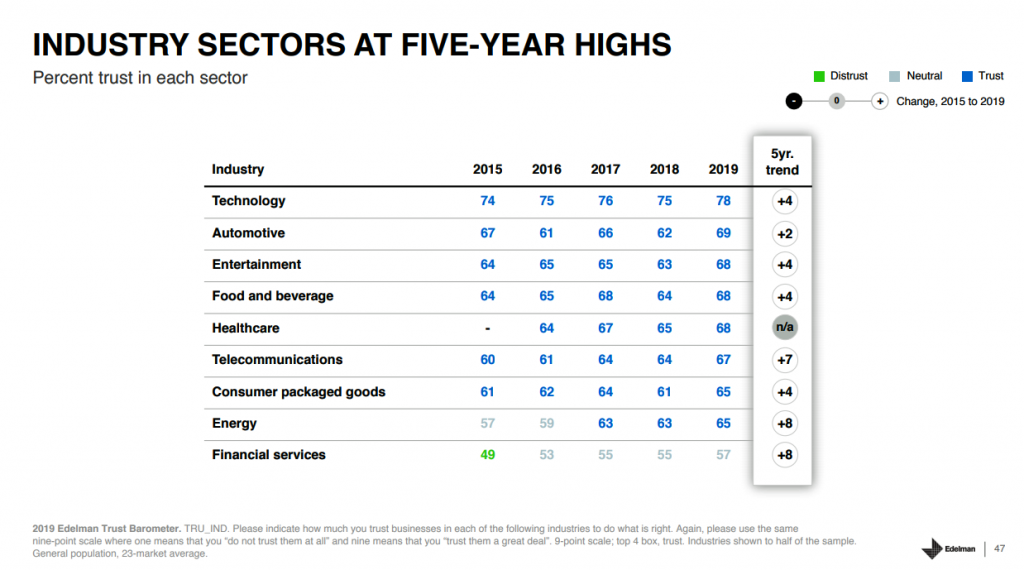
The industry sectors chart compares trust levels across industry sectors. Trust gains among consumers were made across every industry sector….except for healthcare. Energy and financial services gained the most trust margin, followed by telecomms.
Healthcare stayed flat over the year, with about two-thirds of consumers trust the sector versus a high of 78% of consumers trusting technology. This, even in a year of the Facebook/Cambridge Analytica story, innumerable personal data breaches, and growing concerns about privacy.
Let’s overlay the lens of women-as-healthcare-consumers on the Trust Barometer findings. Women tend to be the Chief Health Officers of their families and homes, driving the large percentage of decisions and dollars related to healthcare and retail health purchases.
See this new podcast from The Commonwealth Fund on how U.S. healthcare fails women for some context.
If trust is a precursor of health engagement, then employers, governments, and media have to do a better job to engage women, who have the power to move dollars and traffic to one health/care destination versus another.
In particular, if technology entrants into health care can tailor and design services and streamlined life-flows based on women’s values and personal trust barometers, these new-fangled services may capture market share among these Chief Health Officers.


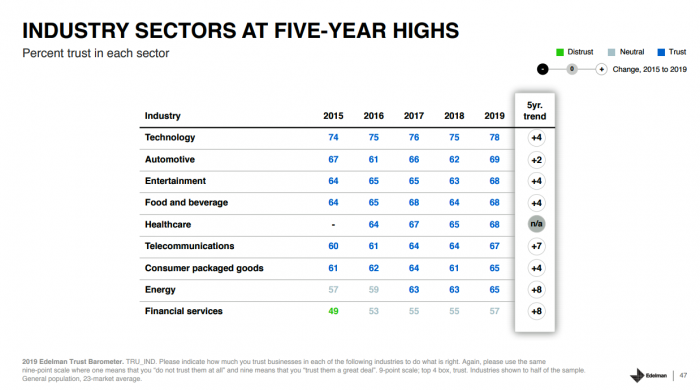


 I'm in amazing company here with other #digitalhealth innovators, thinkers and doers. Thank you to Cristian Cortez Fernandez and Zallud for this recognition; I'm grateful.
I'm in amazing company here with other #digitalhealth innovators, thinkers and doers. Thank you to Cristian Cortez Fernandez and Zallud for this recognition; I'm grateful. Jane was named as a member of the AHIP 2024 Advisory Board, joining some valued colleagues to prepare for the challenges and opportunities facing health plans, systems, and other industry stakeholders.
Jane was named as a member of the AHIP 2024 Advisory Board, joining some valued colleagues to prepare for the challenges and opportunities facing health plans, systems, and other industry stakeholders.  Join Jane at AHIP's annual meeting in Las Vegas: I'll be speaking, moderating a panel, and providing thought leadership on health consumers and bolstering equity, empowerment, and self-care.
Join Jane at AHIP's annual meeting in Las Vegas: I'll be speaking, moderating a panel, and providing thought leadership on health consumers and bolstering equity, empowerment, and self-care.